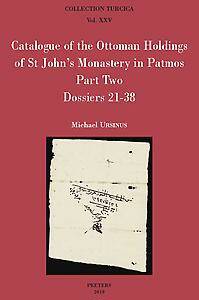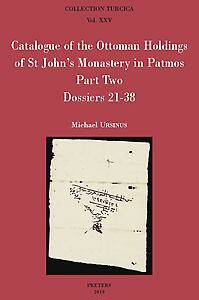
- Afhalen na 1 uur in een winkel met voorraad
- Gratis thuislevering in België vanaf € 30
- Ruim aanbod met 7 miljoen producten
- Afhalen na 1 uur in een winkel met voorraad
- Gratis thuislevering in België vanaf € 30
- Ruim aanbod met 7 miljoen producten
Catalogue of the Ottoman Holdings of St John's Monastery in Patmos, Part Two
M Ursinus
€ 174,95
+ 349 punten
Omschrijving
This is the follow-up volume of the Catalogue du fonds ottoman des archives du monastere de Saint-Jean a Patmos. Les vingt-deux premiers dossiers published in 2011 by Nicolas Vatin, Gilles Veinstein and Elizabeth Zachariadou. Presented here are the dossiers 21-38 which include documents from as early as 1531 and as late as March 1911 (towards the very end of Ottoman rule in the Archipelago). This wide chronological span is coupled by an extensive geographical range: The Ottoman documentation kept in the archives of the monastery of St John the Theologian on Patmos reaches from the coasts of Algiers and Tunisia to the Crimea and the Sea of Asov. It also covers a wide range of subjects (from 'apostasy' to 'violence'), among them maritime trade, seafaring, piracy and shipwreck; fields and field produce; churches and church repair; inheritance issues and the establishment of Christian pious foundations; various forms of tax collecting across the Archipelago; but also evidence of oppression and injustice. Not all the hardship and injustice resulted from Ottoman rule; on the contrary, tensions and rivalries between monastic and lay bodies constituted an important factor throughout, as did disputes between and within local Greek families. The need to look for Ottoman justice and officialdom in far-away Kos (there never was a Muslim judge installed permanently on Patmos) constitutes an administrative 'abnormality' which has undoubtedly contributed significantly to the uniqueness of the Patmian experience throughout the centuries of Ottoman rule.
Specificaties
Betrokkenen
- Auteur(s):
- Uitgeverij:
Inhoud
- Aantal bladzijden:
- 430
- Taal:
- Engels
- Reeks:
- Reeksnummer:
- nr. 25
Eigenschappen
- Productcode (EAN):
- 9789042938441
- Verschijningsdatum:
- 3/12/2019
- Uitvoering:
- Paperback
- Formaat:
- Trade paperback (VS)
- Afmetingen:
- 160 mm x 239 mm
- Gewicht:
- 725 g

Alleen bij Standaard Boekhandel
+ 349 punten op je klantenkaart van Standaard Boekhandel
Beoordelingen
We publiceren alleen reviews die voldoen aan de voorwaarden voor reviews. Bekijk onze voorwaarden voor reviews.







